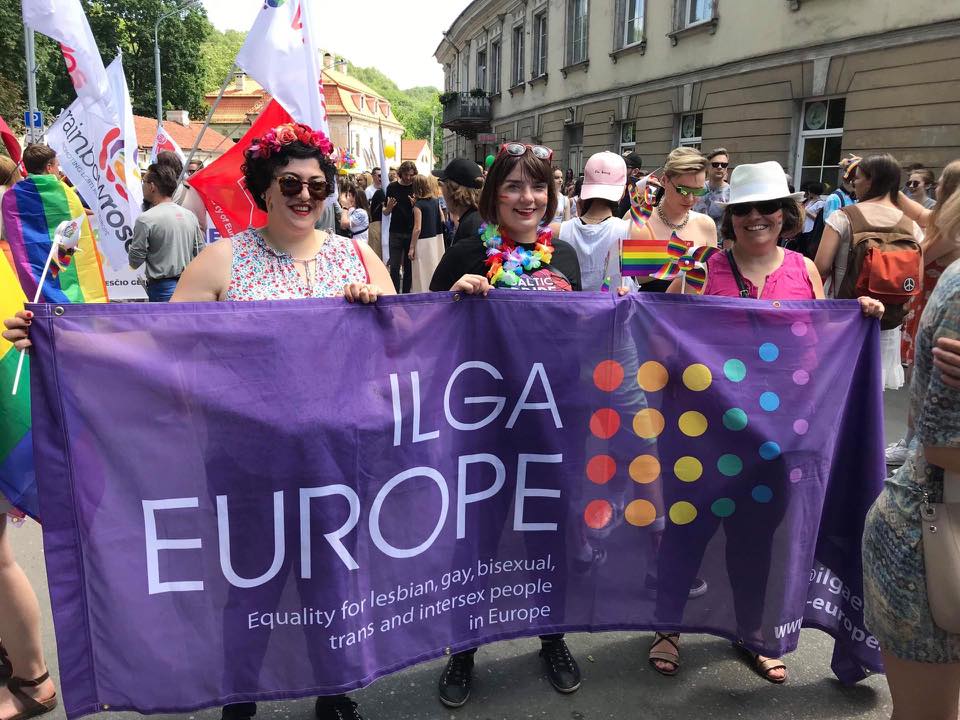- About
- Topics
- Picks
- Audio
- Story
- In-Depth
- Opinion
- News
- Donate
- Signup for our newsletterOur Editors' Best Picks.Send
Read, Debate: Engage.
| June 08, 2022 | |
|---|---|
| topic: | LGBT Rights |
| tags: | #LGBTQ+ rights, #United Kingdom, #Poland, #Pride Month |
| located: | Hungary, Germany, United Kingdom, Bosnia and Herzegovina, Poland |
| by: | Katarina Panić |
ILGA-Europe, an LGBTQ+ advocacy group, recently published its annual Rainbow Map and Index on the state of queer rights in Europe and Central Asia, indicating progress in several countries, set-backs in others and stagnation in the majority of surveyed nations.
For the seventh year in a row, Malta ranks number one on the list (as the nation granting the most rights and freedoms to members of the LGBTQ+ community), followed by Denmark and Belgium, with Azerbaijan, Turkey and Armenia maintaining their position held over the last two years at the very bottom of the scale.
Currently, 20 out of 49 countries in Europe and Central Asia still offer no protection against sexuality-based hate crimes, while 28 countries have no hate crime laws around gender identity.
Positive developments were observed in Denmark, which is closing anti-discrimination gaps in its current legislation, including equal treatment under the law and a penal code to encompass sexual orientation, gender identity, gender expression and sex characteristics as aggravating factors in hate crime.
Iceland recognised trans parenthood, Germany introduced a ban on intersex genital mutilation and France banned so-called 'conversion therapy' based on sexual orientation and gender identity.
"After years of being stalled, there is positive legislative movement in Greece, Latvia, Lithuania, Serbia, Slovakia and Slovenia, countering the narrative that there is an East/West divide on LGBTI rights in Europe, providing governments in these countries with strong opportunities to underpin democracy through adoption and implementation," reads the report.
In its press release about the report, ILGA named several countries that were once global leaders on LGBTI rights and are now experiencing major setbacks. It also noted that some countries are in danger of following the precedent of leaders instrumentalising LGBTQ+ issues for political gains.
The United Kingdom registered the most dramatic drop in its score - from 10th to 14th place. The equality body is not fulfilling its mandated stipulation to effectively protect sexual orientation and gender identity. ILGA added that the UK government is not acting on long-promised reforms on gender recognition and the banning of so-called ‘conversion therapy’ for trans people.
The deteriorating situation in Eastern Europe as far as LGBTQ+ rights are concerned was also spotlighted by ILGA. "Amid a rise in official anti-LGBTI sentiment in Bulgaria and Romania, both countries are now not far off the lowest ranking in the EU, which currently belongs to Poland," the organisation stated.
"Romania is losing points due to authorities' obstruction of freedom of assembly by banning and punishing Pride events. Meanwhile, the ILGA stated that Hungary moved down three places, mainly because its parliament adopted several amendments that directly discriminate against LGBTI people."
This year’s findings are a welcome contrast to the 2021 map, which identified complete stagnation in LGBTQ+ rights across the surveyed countries. That said, there are still numerous countries in a state of stagnation. Bosnia-based LGBTQ+ activist Branko Ćulibrk says that in the three years that have passed since the first-ever pride march took place in this country, it continued to stagnate on the rainbow scale. Bosnia ranks 22 on ILGA's list and provides 38 percent of the legal and political rights used as a barometer to determine countries' support and protection of the LGBTQ+ community.
One of the main ways in which the Bosnian authorities crack down on the queer community, Ćulibrk claims, is imposing restrictions on freedom of assembly and making it more expensive and bureaucratically cumbersome to gather legally.
"Namely, [organisers of pride parades] are obliged by the police to secure the gathering additionally," Ćulibrk told FairPlanet. "In contrast, those who organise counter-protests are in a privileged position regarding the measures. For instance, last time their costs were as low as 10 euros, while our costs were 15,000 euros."
He added that the Sarajevo canton government ultimately took over these costs following intense public pressure, but argued that inequality there persists nonetheless.
"This year, we have the same situation again. We were asked to cover the same costs. Our gatherings are completely peaceful. The counter-protests are not. Why should we pay extra to keep us safe from violent ones?" asked Ćulibrk. "It shows the lack of sensibility for marginalised groups in general."
On the other hand, some countries reached higher positioned on the scale compared to previous years. Yet activists claim that are circumstances that should make things much better.
"Montenegro made the biggest progress [in the Balkans], adopting the law on same-sex partnerships," Ćulibrk said. "Croatia has LGBT+ families who succeeded in adopting the children. In Serbia, the situation is maybe the most problematic: the country elected [an openly lesbian woman] as prime minister, [but] she hardly does anything to improve LGBT+ people’s rights, not even advocating for the same-sex relationships law on the table over the last several years."
Image by Karollyne Hubert.
By copying the embed code below, you agree to adhere to our republishing guidelines.

